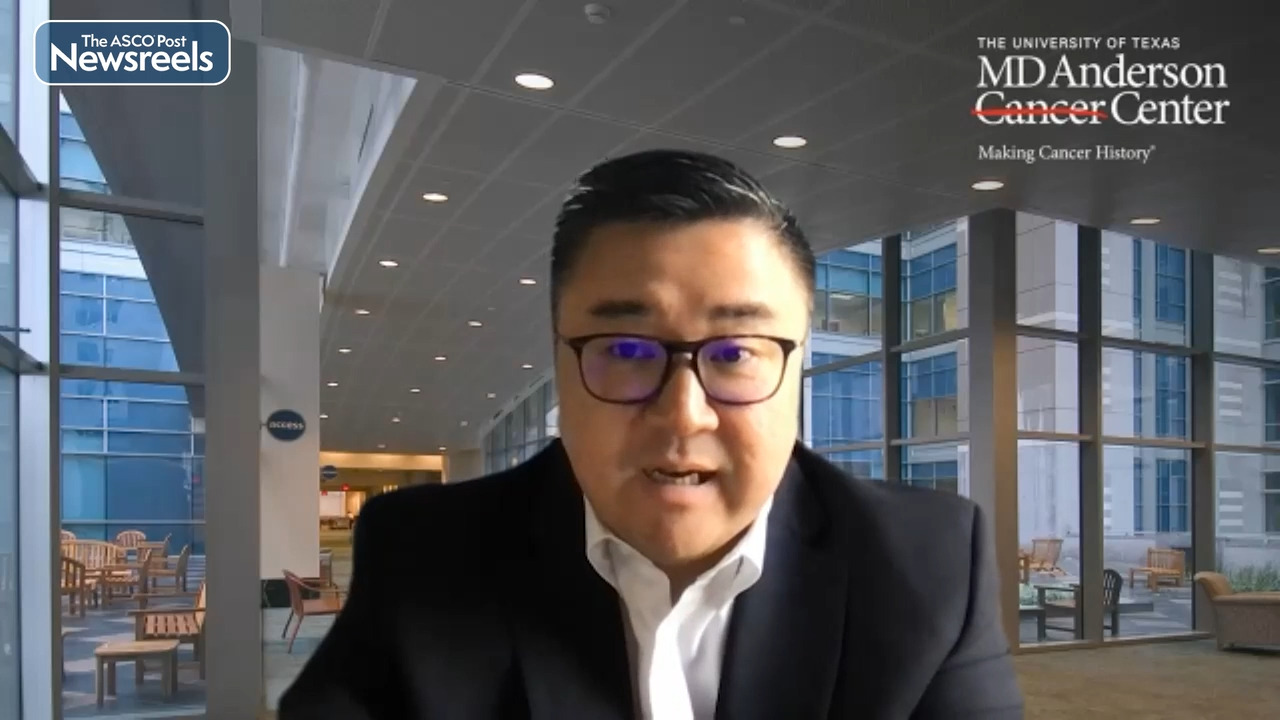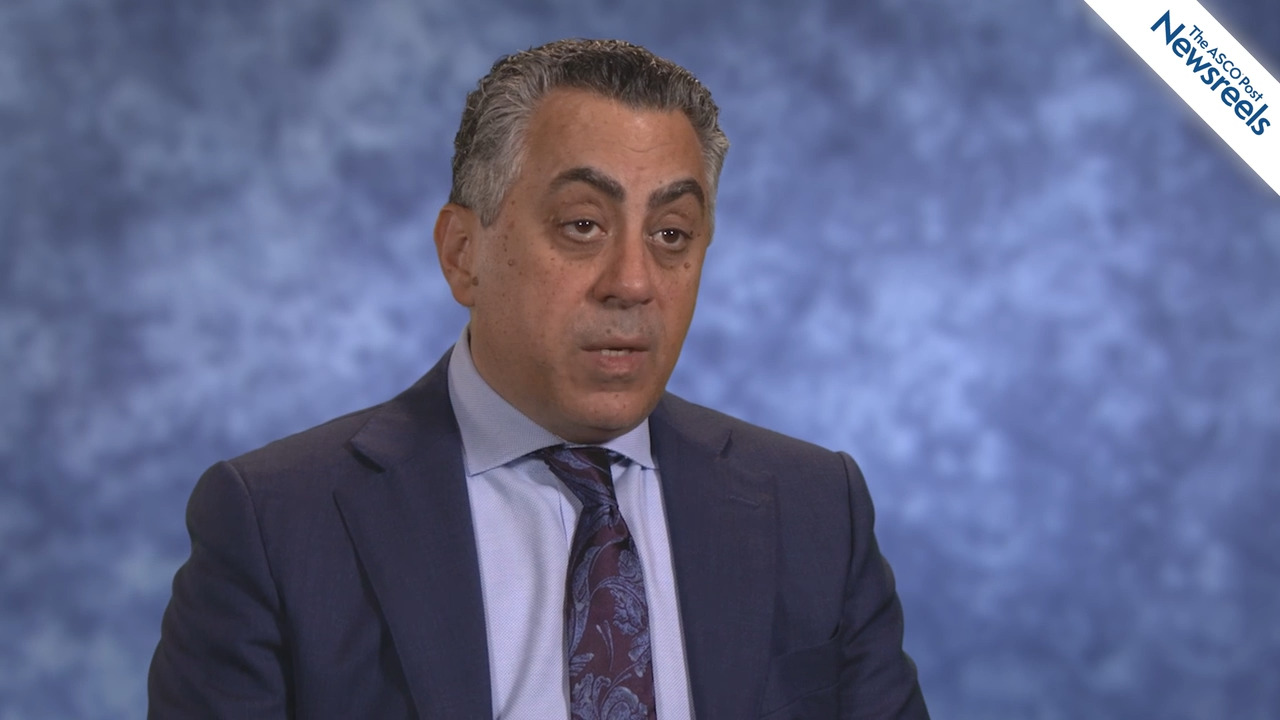Incidence of Cholelithiasis or Cholecystitis in the Year Prior to a Diagnosis of Pancreatic Ductal Adenocarcinoma
Patients with pancreatic ductal adenocarcinoma were six times more likely to have had gallstone disease within the year prior to diagnosis of pancreatic ductal adenocarcinoma than patients without cancer, according to research presented by Papageorge et al at Digestive Disease Week 2022 (Abstract...
Early Postoperative Algorithm-Based vs Usual Care After Pancreatic Resection
In a Dutch nationwide trial reported by Smits et al in The Lancet, researchers in the Dutch Pancreatic Cancer Group found that algorithm-based early postsurgical care was associated with a reduced risk of the composite outcome of bleeding requiring invasive intervention, organ failure, and 90-day...
Ipilimumab/Nivolumab in Patients With Metastatic Pancreatic or Biliary Cancer and HRD Pathogenic Germline Variants
In a single-institution case series reported in a research letter in JAMA Oncology, Terrero et al found that the combination of ipilimumab and nivolumab was active in patients with chemotherapy-refractory metastatic pancreatic or biliary cancer with homologous recombination deficiency (HRD)...
Christine A. Iacobuzio-Donahue, MD, PhD, on Pancreatic Cancer: Novel Insights Into Genetics and Evolution
Christine A. Iacobuzio-Donahue, MD, PhD, of Memorial Sloan Kettering Cancer Center, discusses her research on the evolutionary features of advanced stage pancreatic cancers and the insights that may be used to help improve patient outcomes (Abstract PL05).
SBRT Plus Nivolumab With or Without Ipilimumab in Refractory Metastatic Pancreatic Cancer
In the Danish single-institution phase II CheckPAC study reported in the Journal of Clinical Oncology, Chen et al found that the combination of nivolumab and ipilimumab plus stereotactic body radiotherapy (SBRT) improved the clinical benefit rate vs nivolumab plus SBRT in patients with refractory...
Timothy A. Yap, MBBS, PhD, on Ovarian, Breast, Pancreatic, and Prostate Cancers With Genetic Mutations: A First-in-Human Trial of AZD5305
Timothy A. Yap, MBBS, PhD, of The University of Texas MD Anderson Cancer Center, discusses results from the PETRA study, a first-in-class, first-in-human trial of the next-generation PARP1-selective inhibitor AZD5305 in patients with BRCA1/2, PALB2, or RAD51C/D mutations in advanced or metastatic ovarian cancer, HER2-negative breast cancer, pancreatic, or prostate cancer. Target engagement was demonstrated across all dose levels, and antitumor activity was observed in selected tumor and molecular subtypes.
An AI Model May Predict Elevated Pancreatic Cancer Risk Using Electronic Health Records
An artificial intelligence (AI) model trained using sequential health information derived from electronic health records identified a subset of individuals with a 25-fold risk of developing pancreatic cancer within 3 to 36 months, according to results presented by Placido et al at the American...
Margaret A. Tempero, MD, on Pancreatic Adenocarcinoma: Emerging Systemic Therapy Options
Margaret A. Tempero, MD, of the University of California, San Francisco Helen Diller Family Comprehensive Cancer Center, discusses the most effective ways to use the regimens available to treat patients with pancreatic cancer (FOLFIRINOX [fluorouracil, leucovorin, irinotecan, and oxaliplatin] and gemcitabine plus albumin-bound paclitaxel). Dr. Tempero also reviews the upfront use of chemotherapy for resectable disease, and ways to modify these therapies to make them more tolerable for patients. Looking ahead, she expresses hope for the new drugs under development, which may inactivate RAS, a major driver of the disease.
Screening Platform May Contribute to Detection of Early-Stage Pancreatic Cancers, Other Malignancies
A novel screening platform flagged more than 95% of stage I pancreatic cancers, in addition to other early-stage malignancies, according to a pilot study published by Hinestrosa et al in Nature Communications Medicine. If validated by future studies, the approach may offer a new way to detect the...
Effect of Traditional Eligibility Criteria on Enrollment of Black Patients in Pancreatic Cancer Clinical Trials
In a single-center study reported in the Journal of Clinical Oncology, Riner et al found that traditional eligibility criteria for clinical trials in pancreatic ductal adenocarcinoma excluded a higher proportion of Black vs White patients and identified factors that commonly led to exclusion. As...
Expert Point of View: E. Gabriela Chiorean, MD
The invited discussant of the CodeBreaK 100 data, E. Gabriela Chiorean, MD, Professor of Medicine at the University of Washington and Fred Hutchinson Cancer Research Center, and Clinical Director of the Gastrointestinal Medical Oncology program at Seattle Cancer Care Alliance, found the efficacy of ...
CodeBreaK 100: Sotorasib Shows Activity in KRAS G12C–Mutated Pancreatic Cancer
Promising activity in metastatic pancreatic cancer was shown by sotorasib, an inhibitor of the KRAS G12C mutation, in the phase I/II CodeBreaK 100 study presented by John H. Strickler, MD, Associate Professor of Medicine at Duke University Medical Center, Durham, North Carolina, during the February ...
Expert Point of View: Mandana Kamgar, MD, MPH
The ASCO Post invited Mandana Kamgar, MD, MPH, Assistant Professor of Medicine at the Medical College of Wisconsin, LaBahn Pancreatic Cancer Program, Milwaukee, to comment on the KRYSTAL-1 trial. “The KRYSTAL-1 study in totality is a multiphase and multiarm ongoing study exploring the role of...
KRYSTAL-1: Adagrasib Controls Disease in Gastrointestinal Malignancies Beyond Colorectal Cancer
A disease control rate of 100% was achieved in gastrointestinal cancers treated with the KRAS G12C inhibitor adagrasib in the phase II KRYSTAL-1 trial, presented at the 2022 ASCO Gastrointestinal Cancers Symposium.1 The population included primarily those with pancreatic cancer; other noncolorectal ...
CodeBreaK 100: Sotorasib Shows Activity in KRAS G12C–Mutated Pancreatic Cancer
Promising activity in metastatic pancreatic cancer was shown by sotorasib, an inhibitor of the KRAS G12C mutation, in the phase I/II CodeBreaK 100 study presented by John H. Strickler, MD, Associate Professor of Medicine at Duke University Medical Center in Durham, North Carolina, during the...
SBRT in Combination With Pembrolizumab/Trametinib vs Gemcitabine in Locally Recurrent Pancreatic Cancer
In a Chinese single-institution phase II trial reported in The Lancet Oncology, Zhu et al found that stereotactic body radiotherapy (SBRT) followed by pembrolizumab plus trametinib improved overall survival vs SBRT followed by gemcitabine in patients with postresection, KRAS-mutant, PD-L1–positive...
Study Examines Relationship Between Angiotensin Blockade and Pancreatic Cancer Survival
New research published by Keith et al in BMC Cancer showed that angiotensin blockers—commonly prescribed to treat high blood pressure—may also impact survival in patients with pancreatic cancer. The results are from the largest population-based study of this question and suggest that a broader,...
KRAS G12C Inhibitor Sotorasib Shows Activity in Certain Patients With Pancreatic Cancer
Sotorasib, an irreversible inhibitor of KRAS G12C, showed activity in patients with metastatic pancreatic cancer and a KRAS G21C mutation enrolled in the phase I/II CodeBreaK100 study. These findings were presented during the February 2022 ASCO Plenary Series session by John H. Strickler, MD,...
Niraparib in Previously Treated Patients With Metastatic Castration-Resistant Prostate Cancer and DNA Repair Gene Defects
In the phase II GALAHAD trial reported in The Lancet Oncology, Matthew R. Smith, MD, and colleagues found that the poly (ADP-ribose) polymerase (PARP) inhibitor niraparib showed activity in patients with metastatic castration-resistant prostate cancer and DNA repair gene defects whose disease had...
Neoadjuvant Chemoradiotherapy vs Upfront Surgery in Resectable and Borderline Resectable Pancreatic Cancer
As reported in the Journal of Clinical Oncology by Versteijne et al, long-term follow-up of the Dutch phase III PREOPANC trial has shown an overall survival benefit among patients receiving neoadjuvant chemoradiotherapy vs upfront surgery for resectable and borderline resectable pancreatic cancer;...
KRYSTAL-1: Adagrasib Controls Disease in Gastrointestinal Malignancies Beyond Colorectal Cancer
A disease control rate of 100% was achieved in gastrointestinal cancers treated with the KRAS G12C inhibitor adagrasib in the phase II KRYSTAL-1 trial, presented at the 2022 ASCO Gastrointestinal Cancers Symposium.1 The population included primarily those with pancreatic cancer; other noncolorectal ...
Study Examines Role of Hyaluronic Acid in Pancreatic Cancer Growth
Hyaluronic acid is a known presence in pancreatic tumors, but a new study published by Kim et al in eLife has shown that hyaluronic acid can also act as a nutrient to fuel pancreatic cancer metabolism. These findings provide insight into how pancreatic cancer cells grow and indicate new...
Tanios S. Bekaii-Saab, MD, on Pancreatic and Other Tumors With KRAS G12C Mutation: Updated Data on Use of Adagrasib
Tanios S. Bekaii-Saab, MD, of Mayo Clinic, discusses new findings from the KRYSTAL-1 study, which suggested adagrasib monotherapy is well tolerated and demonstrates clinical activity in pretreated patients with unresectable or metastatic pancreatic cancer or other gastrointestinal tumors harboring a KRAS G12C mutation. Adagrasib is an inhibitor of the KRAS G12C mutation (Abstract 519).
Use of Adjuvant Chemotherapy in Older Patients With Pancreatic Cancer and Its Effect on Overall Survival
In a study reported in JAMA Oncology, Mehtsun et al found patterns of increasing use of adjuvant chemotherapy over time among patients aged ≥ 80 years undergoing pancreaticoduodenectomy for pancreatic ductal adenocarcinoma. In addition, they found that use of adjuvant chemotherapy was associated...
Neoadjuvant Chemoradiation Plus Pembrolizumab Shows No Effect on Tumor-Infiltrating Lymphocytes in Pancreatic Cancer
The addition of the checkpoint inhibitor pembrolizumab to neoadjuvant chemoradiation has failed to overcome the immunosuppressive microenvironment of pancreatic cancer, according to data presented by Osama E. Rahma, MD, and colleagues at the Society for Immunotherapy of Cancer (SITC) 2021 Annual...
Incidence of Pancreatic Cancer in the United States by Age and Sex, 2000–2018
In a study reported in a research letter in JAMA, Gaddam et al found that the incidence of pancreatic cancer has increased in both men and women between 2000 and 2018, with a greater relative increase being observed in younger women. Pancreatic cancer incidence rates per 100,000 population...
Study Finds Incidence of Pancreatic Cancer May Be Rising in Younger Women
The incidence of pancreatic cancer—which historically has been higher in men than in women—has increased among both men and women during the past decade, with a significantly greater relative increase observed in women younger than age 55 years, and especially among those aged 15 to 34 years. These ...
Study Finds Some Pancreatic Cancer Trial Eligibility Criteria Disproportionately Exclude Black Patients
Although lack of clinical trial participation is associated with worse survival outcomes in some malignancies, data show that Black patients with cancer represent just 7.3% of participants—and only 4.5% for such cancers as multiple myeloma—in cancer clinical trials, compared with 84.2% for White...
Risk of Pancreatic Cancer Associated With Germline ATM Pathogenic Variants
In a multicenter cohort study reported in JAMA Oncology, Hsu et al found that among pancreatic cancer kindreds, individuals with germline ATM pathogenic variants had a sixfold increased risk of developing pancreatic cancer vs noncarriers of pathogenic variants. Study Details The study involved data ...
Tackling the Challenge of Pancreatic Cancer: New Approaches
Pancreatic cancer remains an incorrigible foe, but recent advances in genomic profiling and targeted drug development are slowly improving the outlook for patients, according to Eileen M. O’Reilly, MD, Winthrop Rockefeller Endowed Chair in Medical Oncology and Section Head,...
Expert Point of View: Thomas Seufferlein, MD, PhD
The invited discussant of APACT,1 Thomas Seufferlein, MD, PhD, Professor of Medicine at the University of Ulm in Germany, said the updated overall survival data “suggest an improved outcome with nab-paclitaxel plus gemcitabine vs gemcitabine alone…. The combination improves long-term survival and...
APACT: 5-Year Overall Survival Data Suggest Improved Outcomes in Pancreatic Cancer With Nab-paclitaxel/Gemcitabine
The 5-year outcomes in the APACT trial uphold the overall survival benefit with nab-paclitaxel plus gemcitabine in the adjuvant treatment of patients with resected pancreatic cancer, according to Margaret A. Tempero, MD, Director of the University of California San Francisco Pancreas Center, who...
Comparison of First-Line Chemotherapy Strategies in Metastatic Pancreatic Cancer
In a French phase II trial (PANOPTIMOX-PRODIGE) reported in the Journal of Clinical Oncology, Dahan et al found that 4 months of FOLFIRINOX (fluorouracil, leucovorin, irinotecan, oxaliplatin) followed by leucovorin/fluorouracil maintenance was associated with favorable outcomes vs 6 months of...
Prevalence of Homologous Recombination Deficiency in Patients With Pancreatic Cancer
In a systematic review and meta-analysis reported in the Journal of Clinical Oncology, Casolino et al identified the prevalence of homologous recombination deficiency (HRD) genes in patients with pancreatic ductal adenocarcinoma and found that the reported prevalence of HRD was higher with...
SBRT Plus Pembrolizumab/Trametinib vs Gemcitabine in Locally Recurrent Resected Pancreatic Cancer
In a Chinese phase II trial reported in The Lancet Oncology, Zhu et al found that stereotactic body radiotherapy (SBRT) plus pembrolizumab and trametinib produced a modest—but statistically significant—overall survival benefit vs SBRT plus gemcitabine in patients with locally recurrent resected...
Expert Point of View: Thomas Seufferlein, MD, PhD
The invited discussant of APACT,1 Thomas Seufferlein, MD, PhD, Professor of Medicine at the University of Ulm in Germany, said the updated overall survival data “suggest an improved outcome with nab-paclitaxel plus gemcitabine vs gemcitabine alone…. The combination improves long-term survival and...
APACT: 5-Year Overall Survival Data Suggest Improved Outcomes in Pancreatic Cancer With Nab-Paclitaxel Plus Gemcitabine
Five-year outcomes in the APACT trial uphold the overall survival benefit with nab-paclitaxel plus gemcitabine in the adjuvant treatment of patients with resected pancreatic cancer, according to Margaret A. Tempero, MD, Director of the University of California San Francisco Pancreas Center, who...
Molecular Imaging May Improve the Staging and Treatment of Pancreatic Ductal Adenocarcinoma
For patients with pancreatic ductal adenocarcinoma, molecular imaging may improve staging and clinical management of the disease, according to research published by Röhrich et al in The Journal of Nuclear Medicine. In a retrospective study of patients with pancreatic ductal adenocarcinomas, the...
Modified FOLFIRINOX Established as Preferred Neoadjuvant Treatment of Borderline Resectable Pancreatic Cancer
In the treatment of borderline resectable pancreatic ductal adenocarcinoma, the Alliance A021501 trial established neoadjuvant treatment with modified FOLFIRINOX (fluorouracil [5-FU], leucovorin, irinotecan, oxaliplatin) as a new benchmark. However, it failed to show the benefit of adding...
Electronic Olfaction System Under Study as Screening Tool for Pancreatic and Ovarian Cancers
An odor-based test that detects vapors emanating from blood samples was able to distinguish between benign and pancreatic and ovarian cancer cells with up to 95% accuracy, according to a new study presented by Johnson et al during the 2021 ASCO Annual Meeting (Abstract 5544). The findings suggest...
A Love for Surgery Underpins a Career Devoted to Patients With Pancreatic Cancer
There are few, if any, more difficult clinical challenges than pancreatic cancer, a disease that continues to confound the oncology community’s quest for cure. Yet, incremental progress and unflagging optimism drive the way forward, thanks to the researchers and clinicians who have dedicated their...
ACMG Clinical Practice Resource Provides New Guidance for Management of Individuals With PALB2 Gene Variants
The American College of Medical Genetics and Genomics (ACMG) has released a clinical practice resource from a global team of specialists in cancer genetics that will help inform the clinical management of patients who harbor a PALB2 variant and may be at increased risk of developing breast,...
Maintenance Rucaparib in Patients With Platinum-Sensitive Pancreatic Cancer and Germline or Somatic BRCA1, BRCA2, or PALB2 Variants
In a single-institution phase II study reported in the Journal of Clinical Oncology, Kim A. Reiss, MD, and colleagues found that maintenance treatment with the poly (ADP-ribose) polymerase (PARP) inhibitor rucaparib produced responses and was associated with good progression-free survival in...
Lenvatinib for Previously Treated Advanced Pancreatic and Gastrointestinal Neuroendocrine Tumors
In a phase II trial (TALENT; GETNE1509) reported in the Journal of Clinical Oncology, Jaume Capdevila, MD, and colleagues found that lenvatinib produced durable responses in patients with previously treated advanced grade 1 or 2 gastroenteropancreatic neuroendocrine tumors. Study Details In the...
Katelyn T. Byrne, PhD, on the Clinical Impact of T-Cell Inflammation in the Tumor Microenvironment
Katelyn T. Byrne, PhD, of the Perelman School of Medicine at the University of Pennsylvania, discusses the first in-depth analysis of the impact of selicrelumab, an anti-CD40 antibody, which was found to enrich T cells in pancreatic tumors, activate the immune system, and alter the tumor stroma (Abstract CT005).
Estimated Shifts in Cancer Incidence and Death Over Next 2 Decades
In the next 2 decades, rankings of incidence and death across cancer types in the United States will undergo important changes, according to new research published by Lola Rahib, PhD, and colleagues in JAMA Network Open. The study estimates that pancreatic cancer is on course to become the...
Improving Survival for Patients With Stage II Pancreatic Cancer: Chemotherapy Followed by Resection
Patients with stage II pancreatic cancer who are treated with chemotherapy followed by resection live nearly twice as long as patients who receive only chemotherapy, according to a recent study published by Amanda K. Arrington, MD, MHM, FACS, and colleagues in the Journal of the American College of ...
An Integrated Framework for Improving Outcomes in Pancreatic Cancer
Drawing on several lines of ongoing research, David A. Tuveson, MD, PhD, has created a theoretical framework to consider while developing clinical trials in pancreatic cancer. In his keynote lecture at the 2020 American Association for Cancer Research (AACR) Special Conference on Pancreatic Cancer, ...
New Maintenance Therapies in Metastatic Pancreatic Cancer Aim to End Perpetual Chemotherapy
The advent of effective combination chemotherapies has changed the treatment landscape for metastatic pancreatic cancer, extending median survival and leading to durable responses in a subset of patients. However, perpetual chemotherapy is cumulatively toxic, leading to progressive bone marrow...
Expert Point of View: Marcus Noel, MD, and Susan Tsai, MD, MHS
Marcus Noel, MD, Associate Professor of Medicine at Lombardi Comprehensive Cancer Center and MedStar Georgetown University Hospital, Washington, DC, included SWOG S1505 in the presentation of the Gastrointestinal Cancer Highlights during the ASCO20 Virtual Scientific Program. Susan Tsai, MD, MHS, a ...





